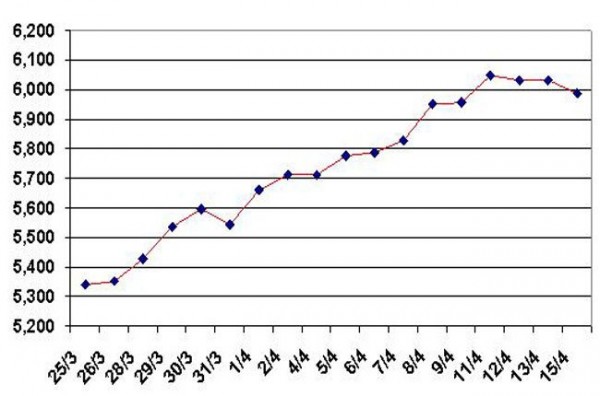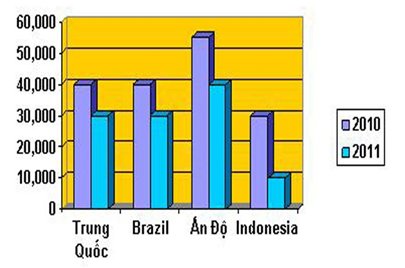This morning, April 16, the price of black pepper in a bucket in Ba Ria-Vung Tau continued to drop at 110,000 VND/kg. Thus, just over 2 days, the price of pepper bucket dropped by 12,000 VND/kg, which means that gardeners have lost 12 million VND/ton, a sharp decrease.
During the past 3 weeks, on the world pepper exchange, Kochi-India, pepper price has grown continuously. Since March 25, the price of pepper for May delivery was equivalent to US$5,338/ton, until April 15, within the past 3 weeks, increased to US$5,990/ton, the increase accounted for 12.2%.

Price of pepper for May futures on Kochi-India exchange.
The domestic price of pepper in the same period also increased from 95,000 VND to 112,000 VND/kg, an increase of 17.9%. The increase in the domestic price of pepper has been higher than the increase of 5.7% in the world during the same period, an unreasonable disparity.
To explain this, it is not beyond the decline in the purchasing power of the domestic currency compared to other hard currencies and the rapid increase in domestic inflation, which has affected the prices of goods in general, including agricultural products. . Besides, it is also the price push of domestic speculators when there is information that the world supply of pepper is in short supply this year.
However, in recent days, pepper prices traded on Kochi – India have leveled off and tended to decrease slightly, leading to a strong reversal of domestic pepper prices.
According to analysts on the exchange, there were a number of Vietnamese companies that sold short because they thought that after March the price would decrease and there would not be many buyers while the futures floor’s price was too high compared to real goods. and importers are stepping up their purchases to close the gap between the two markets.
However, our country’s exporters have clearly seen that the price of pepper has increased continuously in the last 3 weeks, making it difficult for them to find goods compared to every year.
It is expected that this year the world will have a shortage of pepper because the supply of capital is not enough for demand, and the main producing countries have lost their crops, so there is nothing to compensate. Particularly for Vietnam this year, with a plan to export 125,000 tons, occupying the No. 1 position in pepper export, it does not alleviate the supply concern.
A report by Vietnamese traders last week said that in the current high price situation, farmers in producing countries only need to sell 30-40% of their crop this season, which is enough to cover their expenses. expenses and for return investment.
Vietnamese farmers now know how to hold goods to wait for high prices, and they no longer have to worry about selling out like every year, because the high prices of agricultural products help their lives to be more stable.
India, which has competitive pepper prices in the world this year, also tightened supply, although every year India also imports about 10,000 tons for re-export.

This year’s output is expected to decline in key countries, according to Reuters.
The World Pepper Association (IPC) expects India’s output this year to be only 48,000 tons, down 2,000 tons compared to the previous crop. Production in Brazil and Indonesia also decreased slightly while China’s output this year remained unchanged.
Meanwhile, Reuters forecasts that this year, the main producing countries, except Vietnam, will have a serious decline. Therefore, the increase in consumption of major countries will put pressure on the already short supply.
Currently, traders are paying attention to the prices from the Vietnamese side. Vietnamese export traders are pushing the price of 500 Gr/l pepper to US$5,900/ton (FOB), still cheaper than Indian pepper price by US$150-200/ton.
Speculators in domestic agricultural commodities also said that they are looking to buy Indian Asta pepper.
According to the SGTimes
Source link
